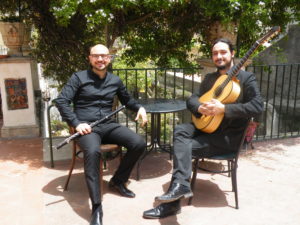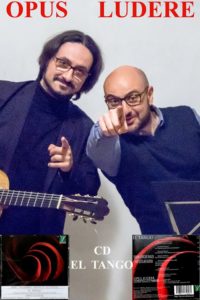Opus Ludere
Domenico Testaì (flauto) e Davide Sciacca (chitarra)

Presentazione del Maestro Andrea Amici di “El Tango”, progetto discografico e concertistico del Duo Opus Ludere. Link al promo del CD.(YouTube)
Andrea Amici scrive:
Uno dei pregi fondamentali degli strumentisti di rilievo, oltre naturalmente al valore interpretativo delle loro esecuzioni unito al trasparente e sapiente uso della tecnica, è quello di saper vivere all’interno del loro tempo, senza trincerarsi dietro quel confine storico che prende il nome di repertorio, avviando al contrario un proficuo dialogo con la contemporaneità, l’attualità di chi la musica la scrive; è spesso una via impervia, ricca di incognite, ma, forse proprio per questo, assolutamente fruttuosa.
In passato il mondo musicale era sicuramente assai più attento alla sua contemporaneità di quanto lo sia oggi, forse perché non ancora contaminato dall’idea che ormai nulla di nuovo possa più esser detto, forse per la necessaria costante ricerca di novità avendo alle spalle un percorso che non dava il senso del compiuto ma del fieri, e il mutuo scambio fra esecutori (committenti) e compositori era prassi comune, della quale nobilissimi esempi che non stiamo qui a ricordare, per obbligo di brevità, hanno costellato l’universo della produzione che ha fatto la storia della musica.
Oggi, invece, “nulla di nuovo può esser detto”: un adagio ormai consolidato – se si guarda al pensiero comune di fronte alla morte delle avanguardie o alle rinascite neoromantiche – che rischia di contrapporre la diffidenza degli esecutori e, alle loro spalle, del mercato musicale e di conseguenza del pubblico, al mondo pur sempre vivo dei compositori. A contraddire tale idea e il “pensiero dominante” si muove tuttavia qualcosa, proprio ad opera (riannodandoci così all’avvio di queste mie considerazioni) di quei musicisti che ancora con ostinazione “credono” nella loro contemporaneità.
È il caso del Duo Opus Ludere, al secolo Domenico Testaì al flauto e Davide Sciacca alla chitarra, con questo loro “El Tango”, progetto discografico e concertistico che porta il nome (ed è per me un onore) di un mio brano per loro scritto verso la fine del 2017; un’idea che muove i suoi passi nel terreno minato di un genere musicale come il “tango d’autore” del quale, appunto, si potrebbe considerare (e tale sarà forse l’opinione comune) ormai definitivamente concluso il ciclo di vita, lasciando spazio soltanto a una mera ricapitolazione del “già detto”.
Il Duo, invece, si è lanciato nella sfida, convincendo e trascinando nella stessa, con l’energia che li caratterizza, un manipolo di compositori contemporanei e monetizzando ben quattro novità assolute, fra le quali anche quella del sottoscritto, concretizzando così un vero e proprio atto di fiducia nella creatività e nella possibilità del nuovo.
Il risultato dell’operazione è un mix di inconsuete prospettive, diversi modi di rapportarsi a un’idea, quella del Tango, e alla sua storia, in dialogo – certo – con la tradizione tramite frammenti di movenze e stilemi, ma soprattutto mettendo in campo una fitta trama di suggestioni offerte all’ascoltatore dal dialogo aperto fra scrittura ed esecuzione: dalla solidità compositiva del trentino Roberto Di Marino, con la sua Sonata per flauto e chitarra e la Ciaccona e lo Studio per i due singoli strumenti, al visionario e disinibito Sdebitango, composto appositamente per il Duo Opus Ludere da Joe Schittino, come me siciliano, ai tre brani scritti da Francesco Santucci (il notturno e sospeso La Luna y lo Ruisenor e La Bruja Loca composti per questo album e Habanera e Tango), alle ascendenze extramusicali del mio El Tango, allegoria del tempo che travolge e perde nel fango, di cui sola memoria vivente diviene, come nelle parole del grande poeta Borges cui il mio brano è direttamente collegato, la danza argentina: “esos muertos viven en el tango”.

Presentazione di Roman Henry Clarke di “El Tango”, progetto discografico e concertistico del Duo Opus Ludere
Roman Henry Clarke writes:
Tango is a musical genre. This statement seems almost revolutionary in an era in which that word evokes passionate movements, Argentine and Uruguayans suburban landscapes, but tends to neglect what this dance finds life from: the music.
And therefore almost a blasphemous act will appear the proposal of a concert tango record, written by contemporary composers. Going deeper, will kick up a fuss the fact that the musicians in the record are Sicilians, one of whom has built the most of his career in Great Britain. Let’s say that even the composers are all Italians, and the Sunday tanguero will be taken down by tears of madness.
But let’s go step by step.
El Tango, this is the name of the CD, is a project that comes from the stage. Born from the precise intent of two performers of rare talent, Domenico Testaì and Davide Sciacca, to give new life to a genre more and more stranded to the role of repetitive accompaniment of dance classes by the views of conformist ‘fans’, only able to accept at the most the latest innovative flashes of this genre, the electronic ones, which have now passed the double decade of life. Given the moniker of ‘Opus Ludere’ (the effort of entertainment), Testaì and Sciacca decided to bring back to the fore the listening and the contemporary essence of tango, untying it from the gymnastic and geographical aspects. And they do it by drawing on the works of excellent authors, and with their support.
Starting from the Roman, and Sicilian by adoption, Andrea Amici, whose work, El Tango precisely, gives the name to the record, part of the exquisite catalogue of a deep and conscious author, able to delineate a deep socio-musicological analysis.
Cosmopolitan composer, Sicilian by birth but famous and very celebrated globally (starting from Germany, the motherland of so many composers), Joe Schittino joins the panel, with a tough but greatly enjoyable ‘Sdebitango’, which witnesses the astounding talent of this artist.
Follows in the list Francesco Santucci, author of soundtracks and saxophonist of the RAI (the Italian state broadcaster) orchestra, some of whose works were premièred by Opus Ludere.
And finally, Roberto Di Marino, born in Trentino and teacher at the Verona Conservatory, author of as much elaborate as fascinating ageless music.
The result is emotion: with an open approach, ‘El Tango’ is enjoyable both by the occasional user and by the lover of art music. Nearly a ‘work by levels of awareness’, in which each listener, and for each person at every new passage, may grab something new.
New, unreleased, unheard are the keywords of the CD: all ‘new music’, no ‘revisited’ or revived ‘classics’, with four compositions, by Amici, Santucci and Schittino, specifically composed and dedicated to the Opus Ludere duo. The whole efforts rendering the whole justice to that contemporary music which in Italy, home of great composers in every era too, seems to be condemned to the relegation of a niche genre, with the only exception of those very few names who have risen to mass popularity. El Tango, and with it Opus Ludere, is therefore projected to a broad scenario, both from a geographical point of view and from that of potential listeners. But don’t fall into the trap of believing it a didactic or popular project: the elements, and the difficulties, of the great contemporary music are all there, to the full enjoyment of the attentive and well-trained listener. But, and it’s a merit, without that certain self-referencing of those composers who have become originally trendy just for being ‘difficult to listen’, first among all those who ignored (and maybe still ignore) that the ‘classical’ music has continued to exist and proliferate. And of the marvellous journey of art music this CD represents an appreciable episode, which deserves every fortune. So
sit,
relax,
listen,
and enjoy the music.
